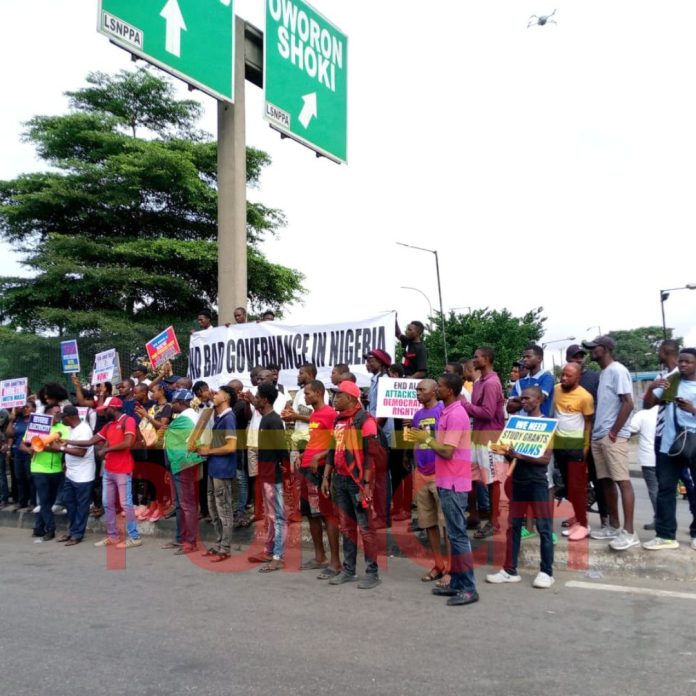

Public health experts have said it is dangerous for Nigerians with chronic health conditions to participate in the ongoing hunger protests in the country due to potential health risks.
The advisory became necessary amid a wave of nationwide demonstrations that have seen increasing participation among the populace.
According Healthwise reports that the nationwide protest has erupted across the country, as citizens express their frustration over the prevailing economic hardship.
Nigerians began the #EndbadgovernanceinNigeria protest on August 1, 2024, to draw the attention of the government to the plight being faced by the masses.
Our correspondent who monitored the protest in parts of Lagos, observed that protesters defied an order obtained from a court, confining them to some areas, and took to the streets, roads, and Gani Fawehinmi Freedom Park, in Lagos, to express their grievances.
Speaking exclusively with According Healthwise, the medical experts noted that protests, characterised by intense physical exertion and emotional stress, could severely impact individuals with cardiovascular diseases, respiratory and mental conditions, and people with Sickle Cell Disease or mobility impairment.
They urged people with pre-existing health issues to find alternative ways to support causes they care about.
A Consultant Public Health Physician at the University of Ilorin Teaching Hospital, Kwara State, Dr Mojirola Fasik, cautioned about the health risks associated with participating in protests, particularly for individuals with chronic health conditions.
Fasik stated that individuals with cardiovascular diseases, such as heart disease and hypertension, are at higher risk due to the physical effort and emotional stress involved in protests.
She explained that those with respiratory issues, including asthma and chronic obstructive pulmonary disease, may face worsening symptoms from exposure to dust, smoke, and tear gas.
The physician added that immunocompromised individuals, such as those undergoing chemotherapy or living with HIV and AIDS, are more vulnerable to infections in crowded and unsanitary environments.
According to her, people with mental health conditions like anxiety disorders and PTSD could experience severe symptoms due to the chaotic nature of protests.
She said, “Several health conditions can make it risky for certain individuals to participate in protests or crowded events. Conditions like heart disease, hypertension, and arrhythmias can be worsened by physical stress, heat, or emotional stress of the protest.
“Asthma, chronic obstructive pulmonary disease (COPD), and other lung diseases can be worsened by tear gas, smoke, dust, or physical exertion.
“Individuals undergoing chemotherapy, those with HIV/AIDS, or those on any other immunosuppressive medications and also those with severe malnutrition are at higher risk for infections, especially in crowded and unsanitary conditions.
“Anxiety disorders, Post-traumatic Stress Disorder , or panic disorders can be triggered by the chaotic and stressful environment of a protest.
“Individuals with Sickle Cell Disease can also be affected by exposure to heat, physical exertion and the stressful environment. And individuals with arthritis, multiple sclerosis, some sickle cell disease patients with Avascular Necrosis of the head of the femur or other conditions that affect mobility may find it difficult to move quickly or avoid dangerous situations.”
On how protest can worsen heart disease, the public health expert said, “Chronic health issues such as heart conditions or respiratory problems can impact one’s ability to participate in protests by making physical demands like standing for long periods or navigating through crowded areas challenging. The stress of these environments can exacerbate symptoms, leading to fatigue, shortness of breath, increased heart rate, and other health complications.
“Due to a lack of physical stamina, conditions like heart disease or COPD can limit endurance, making it difficult to march or stand for long periods. Also, because of their increased vulnerability to environmental hazards, people with respiratory issues are more susceptible to dust, tear gas or smoke inhalation. The health conditions like hypertension or anxiety get worsened by elevated stress levels.
“Also, other chronic health issues, especially those with arthritis or other musculoskeletal conditions, may struggle with prolonged standing or walking, limiting their mobility.”
When asked about risks associated with standing for too long, the physician stated that prolonged standing and navigating through crowded areas could lead to complications such as dizziness, heat stress, and worsened joint pain for individuals with arthritis or mobility impairments.
She also advised pregnant women and young children against participating in protests due to the risks of heat exposure and potential injuries.
For those with chronic conditions who choose to participate, Fasik recommended careful planning, including staying on the edges of the protest, carrying necessary medications, and using mobility aids.
She also suggested that protests should include designated rest areas, first aid stations, and accessible routes to ensure safety.
For individuals unable to attend protests physically, she advised engaging in alternative forms of activism, such as digital campaigns, advocacy, and fundraising, to support social movements while prioritising health and safety.
Corroborating her, a public health physician at the Federal Medical Centre, Abeokuta, Ogun State, Dr Dare Olorunfemi explained that the physical demonstration associated with protests, such as standing for long periods and exposure to environmental elements, could significantly impact those with respiratory or cardiovascular conditions.
He added that the high-stress environment of demonstrations, coupled with the potential for confrontation or violence, can lead to anxiety and increase stress levels.
The physician also warned that exposure to dust, smoke, and tear gas commonly found at protests can trigger acute health episodes and worsen symptoms.
“For individuals with chronic illnesses, even moderate physical activity can lead to serious complications. Protests often involve unpredictable scenarios that can increase stress and physical strain, which can be dangerous.
“For individuals with mental health conditions, such as PTSD or severe anxiety disorders, the chaotic nature of protests can be overwhelming and detrimental to their well-being,” he stated.
He urged people to prioritise health and safety by planning participation carefully, “utilising necessary medical supplies and seeking alternative ways to support social movements, such as digital activism and advocacy.
“There are many ways to advocate for change that do not involve physical risk. Online campaigns, letter-writing, and community organising are all effective methods of engagement that can ensure individuals with chronic conditions remain safe while still making an impact,” he concluded.
Also speaking, a leading Professor of Community Medicine and Public Health at the University of Port Harcourt, Rivers State, Best Ordinioha urged individuals with chronic conditions to carefully consider the risks associated with participation in protest.
The Don highlighted the significant health concerns that could impact those with cardiovascular and respiratory issues during demonstrations.
According to him, chronic health conditions such as hypertension, heart disease, and asthma can worsen the physical demands and environmental stressors found in protest settings.
He noted that prolonged exertion and emotional stress during protests place considerable strain on the heart and lungs, potentially leading to severe complications or even sudden death in vulnerable individuals.
The physician said conditions such as heart disease, hypertension, diabetes, and asthma are particularly susceptible to worsening under protest conditions.
To safely participate in protests, he advised individuals with disabilities or chronic health conditions to prioritise their health.
The professor also suggested engaging in traditional and social media activism as an alternative, allowing individuals to contribute to social movements without compromising their well-being.
“Mostly cardio-respiratory diseases like hypertension, heart disease, bronchitis and allergic diseases like asthma are affected by the protest.
“The exertions put a lot of stress on the fragile lungs and heart, which can malfunction leading to the sudden death of the person
“Standing for long can result in fainting attacks as blood pools in the legs, resulting in short supply to the brain
“Crowded areas are known for their poor air quality, which can trigger asthmatic attack, and respiratory distress due to lowered oxygen in the air.”
When asked how people with disabilities or chronic health conditions can fulfill their desire to participate in protests, the professor stated, “They should engage in traditional and social media activism, providing the intellectual power for the protest.
Join Television Nigerian Whatsapp Now
Join Television Nigerian Facebook Now
Join Television Nigerian Twitter Now
Join Television Nigerian YouTUbe Now






















